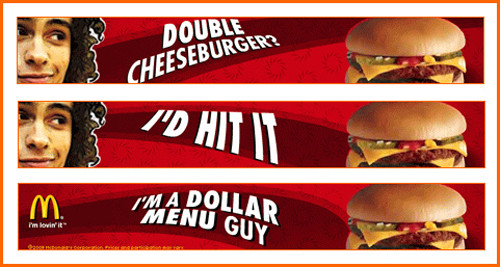McDonald’s “I’d Hit It” Campaign
The Double Cheeseburger Disaster
In 2005, McDonald’s decided to roll out a new ad for their Double Cheeseburger, thinking they had something sizzling. The ad featured a young man ogling the cheeseburger with a simple, bold caption: “I’d hit it.” Now, for anyone unfamiliar with early 2000s slang, this phrase probably seemed innocent enough, just an expression of how much this guy wanted the burger, right?
Wrong. Oh, so very wrong.
For the uninitiated, “I’d hit it” was, and still is, a colloquial way of expressing, well, a strong physical desire, only not for food, something of a sexual nature. Naughty!
Note:
This article features content from the Marketing Made Clear podcast. You can listen along to this episode on Spotify:
That’s Naughty: McDonald’s Epic Misfire
It’s hard to imagine the marketing meeting where this idea got approved – this is always where my mind goes with these car crash marketing campaigns! Maybe someone thought the kids would find it edgy, or that burgers and teen slang made for a hot combo. But what McDonald’s didn’t realise was that pairing “I’d hit it”with their Double Cheeseburger sent a completely different message, one that didn’t exactly scream “family-friendly fast food.”
Within hours of the ad’s release, the public reaction was less “lovin’ it” and more “WTF McDonald’s?, Are You Drunk?” Critics slammed the company for being tasteless and inappropriate. McDonald’s, known for its clown, playgrounds, and Happy Meals, suddenly looked like they were trying to pitch burgers in a nightclub.
The backlash was swift and brutal, with McDonald’s pulling the campaign quicker than you can say “supersize.” Again, you can only imagine the boardroom conversations afterward…“So, we’re going back to the Golden Arches now, right? No more ‘hitting it’? Whose idea was that anyway??”

Car Crash Marketing at Its Finest
This campaign was a textbook example of car crash marketing, the kind of advertising that’s so shockingly misguided that you can’t look away, even as it careens into disaster. But what exactly is car crash marketing? It’s when a brand, either out of desperation, confusion, or sheer ignorance, puts out something so bizarrely off-target that it becomes infamous. The campaign becomes memorable, but not for the reasons the company intended. McDonald’s “I’d Hit It”was such a disaster, it feels like it should be studied in marketing textbooks under “How to do Marketing Badly”.
Why McDonalds “I’d Hit It” is a Car Crash Marketing Campaign
- Poor Segmentation: If you’re going to do something completely different with your advertising, it should be led by the audience you are trying to reach. This includes understanding the kind of media they engage with and messaging that will resonate with them. But if the message is unlikely to resonate with your core audience, you must also understand the kind of media and messaging that they engage with so that you don’t accidentally target them with the wrong kind of message. Proper Segmentation and stakeholder analysis would have avoided this issue.
- Inappropriate Targeting: McDonald’s core audience includes families, kids, and everyone else who wants a quick, greasy fix without a side of awkward sexual innuendo. By using a phrase associated with crude humour, they alienated a significant portion of their customer base. This targeting is a result of poor segmentation (see above).
- Lack of Awareness: The folks behind this campaign apparently didn’t run it by anyone under 25, because if they had, someone would have surely said, “Wait, this is a sex thing!” The company demonstrated a severe lack of awareness of popular culture. It’s unlikely that the younger audience would have thought that this was a purposeful move by McDonalds, only serving to further alienate that segment.
- Backlash Magnification: Instead of capturing the cool, edgy vibe they were going for, McDonald’s instead found itself in the middle of a PR nightmare. Critics slammed the ad for being tasteless, and consumers roasted the company on forums, talk shows, and even at their own dinner tables. The whole world stopped by to watch the wreck.
- Short Lifespan, Long Memory: The ad may have been pulled quickly, but the legacy of the McDonald’s “I’d Hit It” campaign lives on in marketing horror stories. It’s been almost two decades, but whenever someone mentions failed advertising, this campaign inevitably resurfaces, standing as a testament to the fine line between catchy and catastrophic.

Lessons in Marketing (and Burgers)
What can we learn from McDonald’s disastrous dalliance with early 2000s slang?
-
Know your audience: It’s always a good idea to double-check whether your ad copy might, you know, offend the people who buy your product. Fast food companies don’t need to get edgy, they need to stay tasty. Make sure you follow the segmentation, targeting and positioning process, and carry out a stakeholder analysis.
-
Run it by someone who’s in the loop: When using slang, get a young employee or intern to fact-check. They’ll save you from driving into a marketing wall at 90 mph.
-
Sometimes simple is better: “Two cheeseburgers for £4“—see? Easy, clear, and it doesn’t sound like the start of a terrible Tinder conversation.
In the end, McDonald’s “I’d hit it” campaign didn’t land. It didn’t even approach the runway. Instead, it plummeted in a fiery blaze of confusion and bad judgment. But you have to say, like a real car crash, no one could look away, so maybe that’s the ultimate marketing win after all?
Next time you order that Double Cheeseburger, just remember: some things should stay in the kitchen, and not on questionable billboard campaigns.



